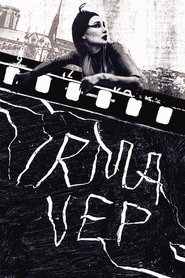Throw all of those mawkish and self-indulgent "it's a love letter to cinema!" films in the trash, Irma Vep is a strikingly absorbing film about the "looming uncertainties of an economically globalized but culturally fragmented future" at the turn of the millennium (Aliza Ma) that should be watched in conversation with Abbas Kiarostami's Close-Up (1990).
In her performance within a performance, Cheung plays subtly varying versions of herself as she navigates networks of clashing egos, unbridled neuroses, and frayed artistic ambitions on and off set. To watch her share a screen with Léaud is to witness the thrilling collision of two formidable cinematic galaxies, a phenomenon that only [director] Assayas could have presented with such concurrent virtuosity and offhandedness. […] Artists grappling with tremendous external forces of upheaval have often shown us that modes of abstraction can be more revealing than works that lay any claim to realism or evince some amount of figurative fidelity.
— Aliza Ma (Criterion)
When the screen finally goes black, when Cheung as Irma Vep is lost to us forever, we feel almost broken. The thief has struck again […].
— Stephanie Zacharek (Salon)
It least in part, Cheung's character comes to Paris to escape the sort of cinema the interviewer [in the film] is blathering on about. In the mid-'90s, Hong Kong was one of the world's hotspots for commercial fare, and the industry turned out hits (and sequels to hits) as reliably as any region in the world. One of the funniest things about Irma Vep is Maggie's sheer bafflement in the face of French inefficiency and self-doubt. Yet there's another side to a smooth-running machine like Hong Kong's, too, which is that all the movies look the same. Assayas doesn't care for either system, and Irma Vep triumphantly points the way to another alternative.

